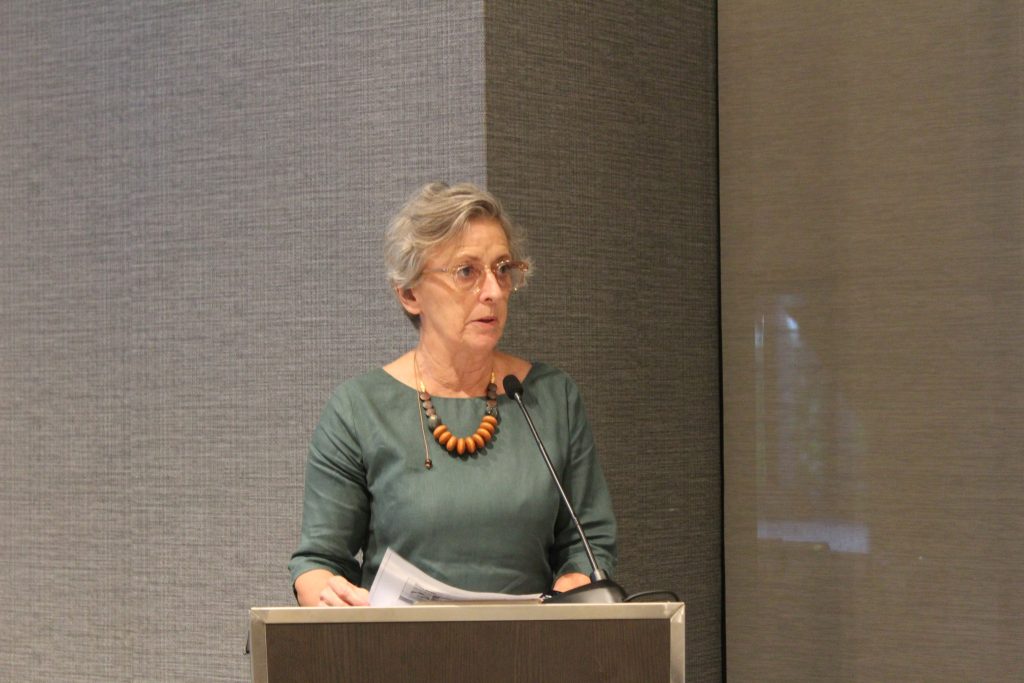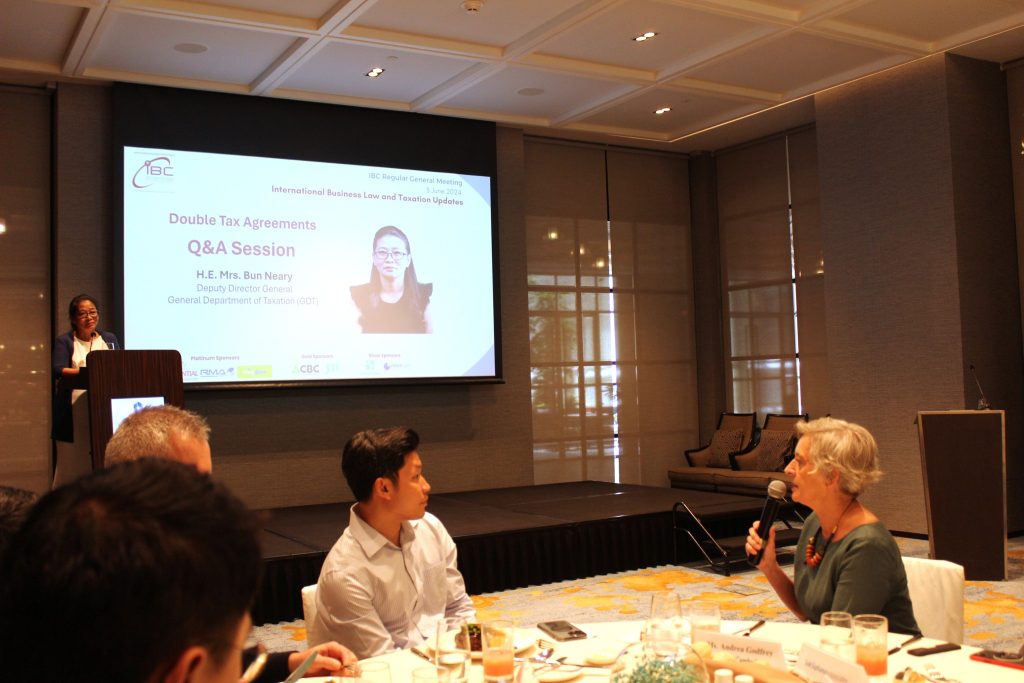Stew Post
Senior Communications Officer Stew Post sat down with Andrea Godfrey, Partner and Head of Integrated International Tax at KPMG, at the firm’s offices on Koh Pich. Andrea shared decades of experience in tax compliance at some of UK’s largest conglomerates during a deep dive that touched on tariffs, governance, and Cambodia’s evolving tax regulations, as the nation moves towards global standards.
Read More: EuroCham Interview of the Week: Sato Moeun, Founder and COO of Mekong Fine Foods
Stew: Can you start with a bit of background about yourself, how did you come to work with KPMG and what has your journey with the firm been like?
Andrea: I started my journey with what was then Coopers & Lybrand (now PwC) as an audit graduate trainee. I specialised in tax quite early on and had the opportunity to do a secondment for two years to Australia. On my return I decided to explore a role in industry. I worked in the infrastructure and construction sector for 12 years as Head of tax at Trafalgar House Construction, Balfour Beaty and Skanska UK, providing tax advice on multimillion dollar contracts globally. One of the landmark projects in the region was the Tsing Ma Bridge leading to what was the new Hong Kong Airport at the time (US$1bn in the 1990’s!). In these roles I had the opportunity to visit many countries, experience differing tax regime, reviewing complex supply chains and contract structures, and the introduction of transfer pricing globally as a concept.
I was offered a job with KPMG Vietnam and Cambodia in 2017 having been working at EY in London for the previous 10 years again in the global infrastructure tax space. I was approached through a recruiter who asked if I would be interested in working overseas again, and what about Vietnam? To be honest neither Vietnam nor Cambodia was on my radar, but I have had absolutely no regrets in taking up the offer to come and work here in the region at KPMG.
My initial role was based in Vietnam, HCMC, but through my role in quality and risk management, I came to visit the Cambodian office several times in 2018 and 2019. I built and led a team in Vietnam in what we call Global Mobility Services, which I grew to be a very successful part of the tax practice.
I was given the opportunity to come to Cambodia at the end of 2023 to lead the International Tax and transfer pricing group and capitalise on Cambodia’s economic potential, going back to my original specialism in international tax.
Stew: As one of Cambodia’s leading professional services firms, how does KPMG support private sector growth? How does this support vary from large operators to SMEs and family-owned enterprises?
Andrea: AT KPMG we are very fortunate to have an outstanding relationship with the Royal Government of Cambodia. This relationship and our leading role in the private sector have combined to create a platform for advocacy that has been instrumental in supporting regulatory reform in Cambodia and thus supporting private sector growth.
We are actively engaged with leading Chambers of Commerce and Business Associations in Cambodia. This has created a channel for bilateral communication between the private sector and the Government of Cambodia and the opportunity to steer change in a positive direction.
Our efforts to support private sector growth in Cambodia are varied, as well as our involvement in advocacy and investment promotion discussed above, we are focused on delivering bespoke solutions for individual businesses, promoting economic resilience, and very importantly, promoting sustainable business practices.
We help businesses navigate Cambodia’s evolving economic landscape. This includes providing strategic guidance on market entry, expansion, and diversification in a variety of sectors like manufacturing, agriculture, and financial services and in the development of new sectors and industries.
We frequently provide workshops across a variety of topics independently or in conjunction with Chambers and Embassies providing insights into regulatory change and discussing practical experience with a view to equipping businesses with knowledge to ensure compliance and to manage risks.
As mentioned, we will tailor our support to meet the needs of individual enterprises be they large MNC’s or smaller SME’s. For large corporations and international firms, KPMG delivers high level advisory and assurance services, including deal advisory, financial risk management, and global transfer pricing. Our specialised country desks provide strategic support for market entry, regulatory compliance, and cross-border operations. For small businesses and family-owned enterprises, we offer targeted solutions to help formalise operations and build sustainable growth. This includes guidance on corporate structures, tax planning, and funding strategies. For established family businesses, we provide expert advice on leadership succession, governance frameworks, and accounting compliance.

Stew: What role does KPMG play in strengthening transparency and trust in Cambodia’s evolving business environment — particularly with regard to tax, compliance, and corporate governance?
Andrea: As stated previously KPMG has a very strong relationship with the Royal Government of Cambodia creating a platform for advocacy that has been instrumental in supporting regulatory reform in Cambodia and thus supporting private sector growth.
KPMG has developed good relationships with the GDT through participation in working group D, presenting together at workshops and events and indeed through interactions in tax audits. The GDT has been an active participant in the annual KPMG Tax institute for several years and has provided the audience with insight and practical guidance to the changing practices of the GDT.
We welcome the implementation by the GDT of the standard operating procedures for tax audit and the new regulations that have been issued clarifying a number of points including the new prakas on transfer pricing and the very recent prakas on Capital Gains Tax and creating greater transparency in the audit and enforcement process.
KPMG has also played an active role in supporting CDC in a number of initiatives including investment promotion and technical updates for a variety of industries. We have also facilitated bilateral discussions with industry leaders and the Royal Government of Cambodia to overcome and address industry challenges.
Overall KPMG plays a significant role in enhancing transparency and trust within Cambodia’s business environment. Through a comprehensive suite of professional services, we help businesses navigate complex regulations and align with international standards which are the key pillars of a transparent and accountable economy. A strong governance is also central to building a trustworthy business environment. KPMG partners with organisations to design and implement robust governance frameworks and internal control systems. These structures promote accountability, reduce risk, and foster long-term stakeholder confidence.
Stew: Concerning today’s hot topic, tariffs and transfer pricing have an inverse relationship, how do you advise those multinational corporations to balance the need to lower customs values to reduce tariffs while also maintaining arm’s-length transfer prices for income tax purposes? What are the biggest risks they face if they get this wrong?
Andrea: To put it in context, we must understand what is happening with tariffs and global trade. We are seeing rising protectionism resulting in increases in tariff and trade barriers: tariff and trade policy volatility impacts tax and Transfer Pricing planning, and creates supply chain uncertainty. The realignment of trade alliances, as countries shift partnerships and enter into new trade alliances, is reshaping the global flow of goods and services and capital, which in turn is affecting tax structures and planning strategies.
Therefore, you cannot look at one aspect in isolation, ie lowering the price of goods, you have to look at the whole operational structure in the context of this new environment to realign your business to get the best result overall and to manage compliance in accordance with regulations — including tax and transfer pricing.
The biggest risk is in not having a full understanding of the business impacts of tariffs and acting to address those impacts through a review of your operational structure.
Specifically relating to your question and addressing the imposition of tariffs by the US. If the price of a product imported into the US is lowered – to reduce the tariff impact – there are likely to be questions raised by US customs. If they see that there is a special relationship between the importer and manufacturer, i.e. they are related parties, they will likely challenge the adjustment to the price and could increase the price on importation.
From a Transfer Pricing perspective here , there would be a question as to whether a manufacturer in Cambodia would achieve a similar net profit margin of comparable companies if they decreased the price. This is likely to lead to a challenge in a tax audit here in Cambodia resulting in a potential adjustment through reassessment by the GDT.
So, the specific risks in this case are a customs valuation increase by the US and a Transfer Pricing valuation increase by the Cambodian GDT.
Stew: Within a multinational corporation, who typically bears the economic burden of a new tariff? Is it the importing entity, the manufacturing affiliate, or is it shared? How do companies determine this, and what are the key transfer pricing implications of that decision?
Andrea: It is likely that the consumer will bear at least part of the tariff cost. However, in some organisations this cost may be shared through the supply chain and where that cost sits will be part of the review of the operational structure considering the impact of tariffs.
As previously stated, any change in the price of goods is potentially open to challenge by US customs and from a TP perspective in Cambodia.
Another way that some organisations are looking at eliminating part of the increased tariff cost is to also increase the selling price of their locally-sourced goods, which again will be a consideration in a review of the overall operational structure of the business post-implementation of the tariffs.

Stew: How are tariffs impacting the selection and application of traditional transfer pricing methods, such as the Comparable Uncontrolled Price (CUP) or the Transactional Net Margin method (TNMM)?
Andrea: If an organisation is in a position where they sell the same product under the same terms to both related and unrelated parties, there should be no impact to the application of the CUP methodology. However, for the Transactional Net Margin method the selection of comparable companies will be important as the impact of the cost of tariffs for goods imported into the US will impact the net margin. As such the entities selected for comparison should have the same level of imports into the US as the company whose pricing is being justified through the TNMM method.
Stew: What advice would you offer to international investors or companies looking to enter the Cambodian market in 2025 and beyond? What are the unique opportunities and challenges they should be aware of example about tax and transfer pricing?
Andrea: Cambodia has an open economy, many promising industries and low barriers to entry. As such Cambodia provides a plethora of investment opportunities for market entry in sectors that are undeveloped in the market here. This can lead to challenges around weak or lack of regulation in certain sectors. But it can also be an opportunity to develop those regulations along with the Royal Government of Cambodia to further support in the growth of the economy here in Cambodia.
As previously mentioned, we welcome the initiatives of the GDT to implement the Standard Operating Procedure for tax audit reform and also the new regulations providing clarity in several areas including TP. We are also aware that the GDT are considering the impact of BEPS (the OECD led global tax reform) and the impact of a global minimum tax and we look forward to further discussions with the GDT and CDC in this area.





